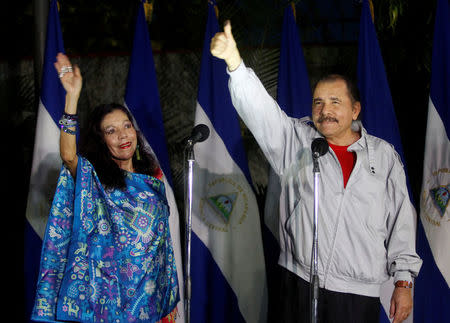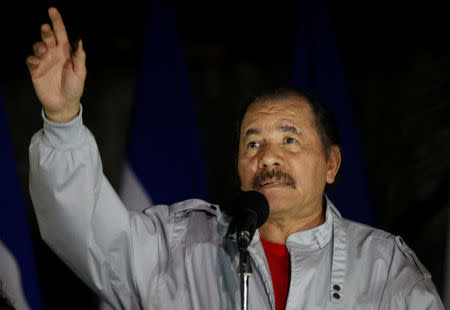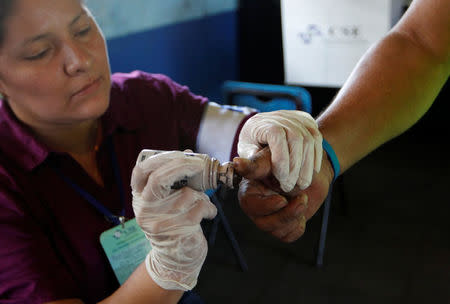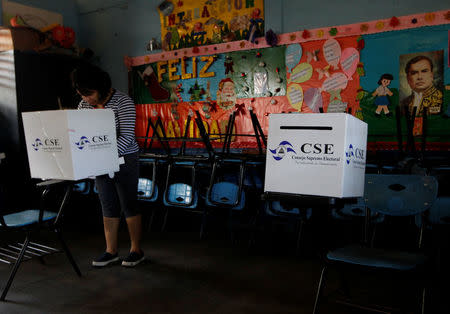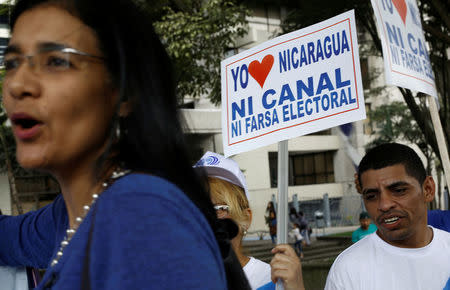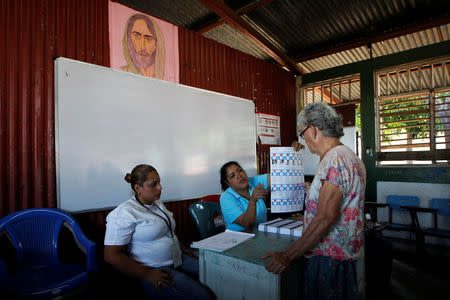U.S. expresses concern over Nicaragua's 'flawed' election
By Lesley Wroughton and Enrique Pretel WASHINGTON/MANAGUA (Reuters) - The United States is "deeply concerned" by the election in Nicaragua, a State Department spokesman said on Monday, a day after former Marxist guerrilla Daniel Ortega clinched a third consecutive term as president. Ortega cruised to a landslide victory after winning over voters with years of strong economic growth and poverty reduction. Nicaraguans chose to overlook the opposition's accusations that he is building a family dynasty. The 70-year-old former guerilla fighter, who ran with his wife, Rosario Murillo, as vice president, had 72.5 percent of the votes, with 99.8 percent of polling stations counted, the electoral board said. By fusing his militant past with a more business-friendly approach, Ortega stands in stark contrast to many once-dominant Latin American leaders whose popularity has plummeted in recent years after they failed to bring more prosperity. Poverty in Nicaragua has fallen almost 13 percentage points under his rule, according to the World Bank. Still, the vote attracted strong criticism from the United States, which has a long and checkered relationship with Ortega. "The United States is deeply concerned by the flawed presidential and legislative electoral process in Nicaragua, which precluded the possibility of a free and fair election on (Sunday)," spokesman Mark Toner said in a statement. He accused the Ortega government of sidelining opposition candidates and limiting local monitoring at polls, and for not inviting international election observers, which Toner said "further degraded the legitimacy of the election." "We continue to press the Nicaraguan government to uphold democratic practices including press freedom and respect for universal human rights in Nicaragua," Toner added. The U.S. government's criticism recalls decades of animosity between the two countries. Ortega, who led troops against U.S.-backed rebels, invoked the years of American meddling in Nicaragua when he cast his vote on Sunday night. "Now it's us, the Nicaraguans, who decide because we no longer have a single Yankee general here," Ortega said. "It's we Nicaraguans who count the votes. This is a sovereign democracy." Ortega and U.S. President Barack Obama have maintained a relatively cordial relationship, although the Nicaraguan leader accused Washington of "interference" in September after Congress passed the Nica Act, which makes U.S. funds for Nicaragua contingent on progress on democracy, human rights and anti-corruption efforts. FIGHTER Opponents have accused Ortega of trying to establish a "family dictatorship" in the country after his Sandinistas pushed constitutional changes through Congress in 2014 that ended presidential term limits. The opposition has been weak and divided for years. Ortega's main rival, the center-right Liberal Constitutionalist Party (PLC) candidate Maximino Rodriguez, came in a distant second with 15 percent of votes, the board said. Emerging as the leader of the Sandinista movement, which toppled dictator Anastasio Somoza in 1979, Ortega led the country during the 1980s, when a civil war against U.S.-backed Contra rebels killed some 30,000 people and unleashed an economic crisis. The opposition views Murillo's vice presidential bid as further evidence of Ortega's power grab, particularly given that rumors about his health have long swirled. "Ortega gets his way and he doesn't care if he violates the rights of others," PLC leader Rodriguez said. "Supposedly he fought against the Somoza dictatorship, and the Sandinistas themselves regard Ortega as worse than Somoza." Hernan Selva, a 22-year-old engineering student and Ortega supporter, dismissed as "the kicks of a drowning man" the complaints by Rodriguez, who fought the Sandinistas in the 1980s as part of the right-wing paramilitary Contras. Venezuelan petrodollars have helped underpin social programs and slash energy costs, while Ortega has forged alliances with the business sector, helping Nicaragua to achieve average growth rates of 5 percent in the past five years. (Reporting by Lesley Wroughton in Washington and Enrique Pretel and Alexandra Alper in Managua, editing by Gabriel Stargardter)

